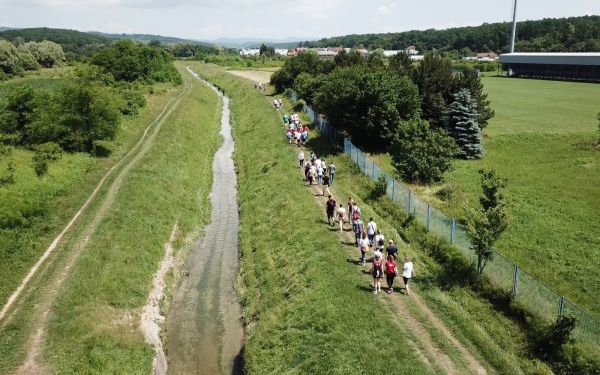Local transformation with nature-based solutions – interview with landscape architect Marijo Spajić
28 April 2022
ProGIreg Front-Runner City Zagreb has managed to successfully utilise nature-based solutions (NBS) to revive the post-industrial district of Sesvete, with the help and active involvement of local actors. One of these entities is local non-governmental association Zelene i Plave Sesvete (Green and Blue Sesvete) a local association managing the proGIreg info centre and activities on site, with the support of the municipality. The local representative of Green and Blue Sesvete, landscape architect Marijo Spajić gave an interview to highlight the factors behind the local success.
Photo: Marijo Spajić
What are the benefits of having nature-based solutions in Zagreb in your opinion?
Nature based solutions, considering it as part of a wider green infrastructure plan, represent an approach to solving individual infrastructural obstacles by imitating natural processes. They are elements of a complex puzzle of interactions, mostly focused on recognizing relationships between different environmental niches. The idea is finding most optimal solutions suited for tackling climate challenges (e.g. heat islands) and, by observing natural processes. By applying acquired knowledge, we try to face problems such as exponential population growth and its consequences on our natural surroundings. While doing so, NBS can support low-cost and sustainable (or rather less invasive) solutions in a spatial context, that otherwise would not be manageable by conventional systems, or would be financially demanding. There is not one replicable solution suited for all problems, but a general principle, which embeds climatic, cultural and other backgrounds.
What have you found to be challenging for the nature-based solutions implementation in Zagreb?
The greatest challenge for the NBS in Zagreb would be legislative frameworks and low awareness of the need for environmental protection, both in the bureaucratic system and with the citizens in general.
What kind of nature-based solutions have you worked with?
Since my profession (landscape architect) is highly involved with NBS, I could say that I have had an opportunity to meet with different concepts of tackling contemporary problems by imitating natural processes. These solutions have differed both by scale and by the relations to nature. Each approach has its vision and set priorities, but they are essentially directed towards solving the same problem – climate change. Since public organizations and large systems in general often demand standardization, we are encouraged to find a singular, practical and intuitive name for them all. In the context of proGIreg we have had the opportunity to meet with the solutions for Zagreb, defined by the project, but also to implement other solutions through various spin-off activities.
What are the main lessons you have learned in this process?
In order for the project to be accepted, it is important to involve citizens in as many decision-making processes as possible. New solutions can create aversion among citizens, primarily due to the fear of the unknown, which is why they declaratively refuse them from the very beginning. Hence, the engagement in co-design workshops for nature-based solutions with local actors, but also continuous communication through various platforms and activities, allows them to process novelties. However, this process is often time-consuming and demands frequent activities, which somehow involve the citizens.
What are the roles of different stakeholders in the implementation?
Municipality has the most important role in the implementation of the solutions, since it is the only credible entity for decision-making. If a city lacks of basic planning documents or there lacks any political will for the implementation, no encouragement from outside stakeholders can lead to change. However, lack of interest for the demands of the citizens or other parties can also be pushed through different channels, such as through the democratic elections. NGO’s can be a great partner in over-coming barriers in communication between the citizens and the government, but also through the adaptability regarding finding pragmatic solutions.
Photo: Replication workshop in Sesvete
What do you think are the best paths to replicate nature-based solutions?
As previously mentioned – there is no one completely replicable solution, rather principles of their development. Observation of successful projects and local natural processes is crucial.
What nature-based solutions would you like to see implemented in Zagreb in the future?
Water management is going to be crucial for the survival of our civilization. If we do not act quickly, we might lose our last chance to properly mitigate global climate change. Proper water management might the key to our adaptability to the extremes, be it in water or heat regimes. However, for that we will have to find a solution for co-existence with the nature, which might mean we will have sacrifice some of our current habits, such as deduction of waterway areas. Ideally, all the waterways in Zagreb should have a great increase in spatial occupancy, which would certainly mean a conversion of parts of urban area and a more significant protection.
Photo: proGIreg info center and Zelene i Plave i Sesvete locale in Sesvete
Learn more about proGIreg’s work in Zagreb here.
Top photo: Vuger Stream North of the proGIreg Living Lab, credit Marijo Spajic


